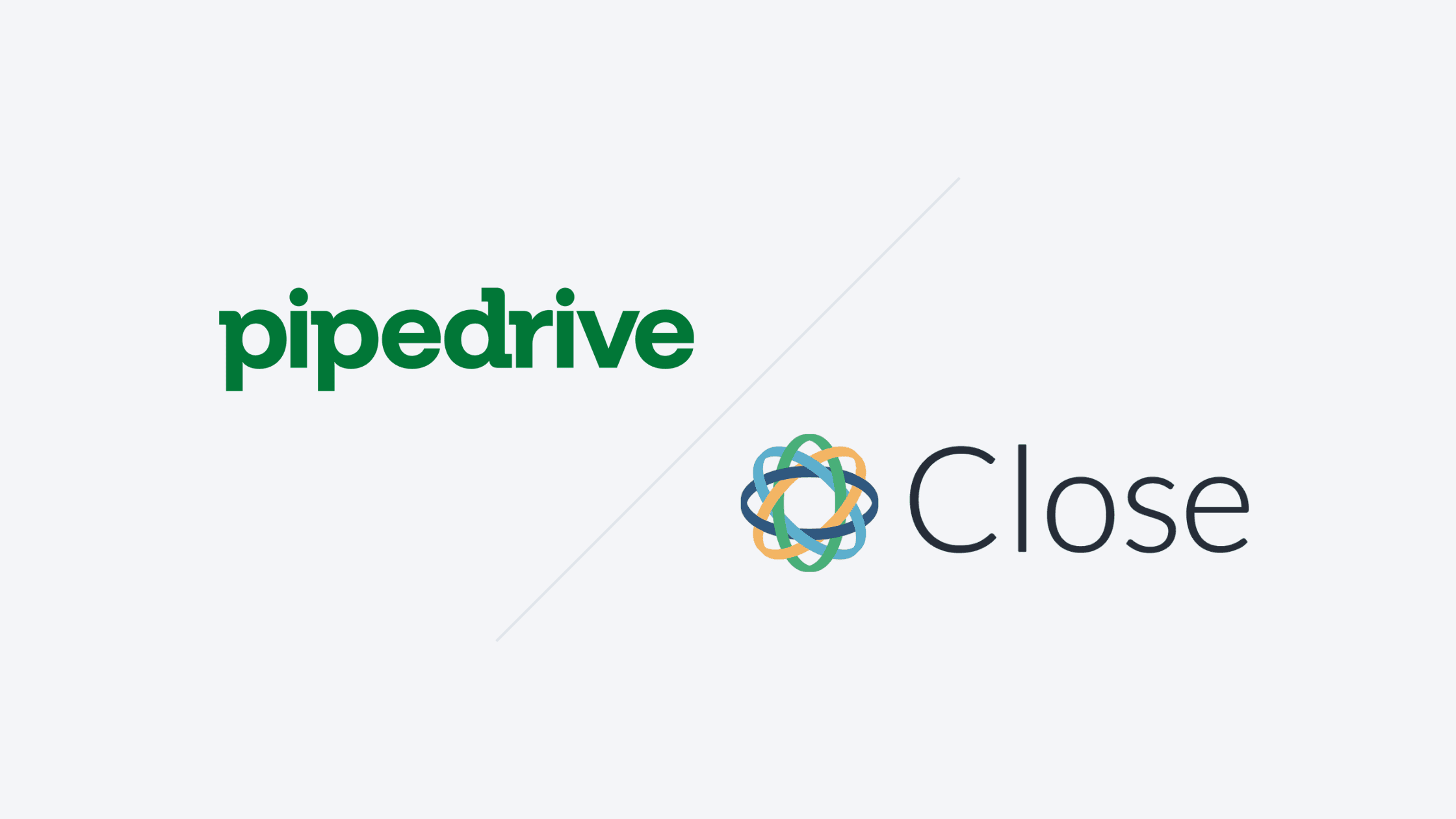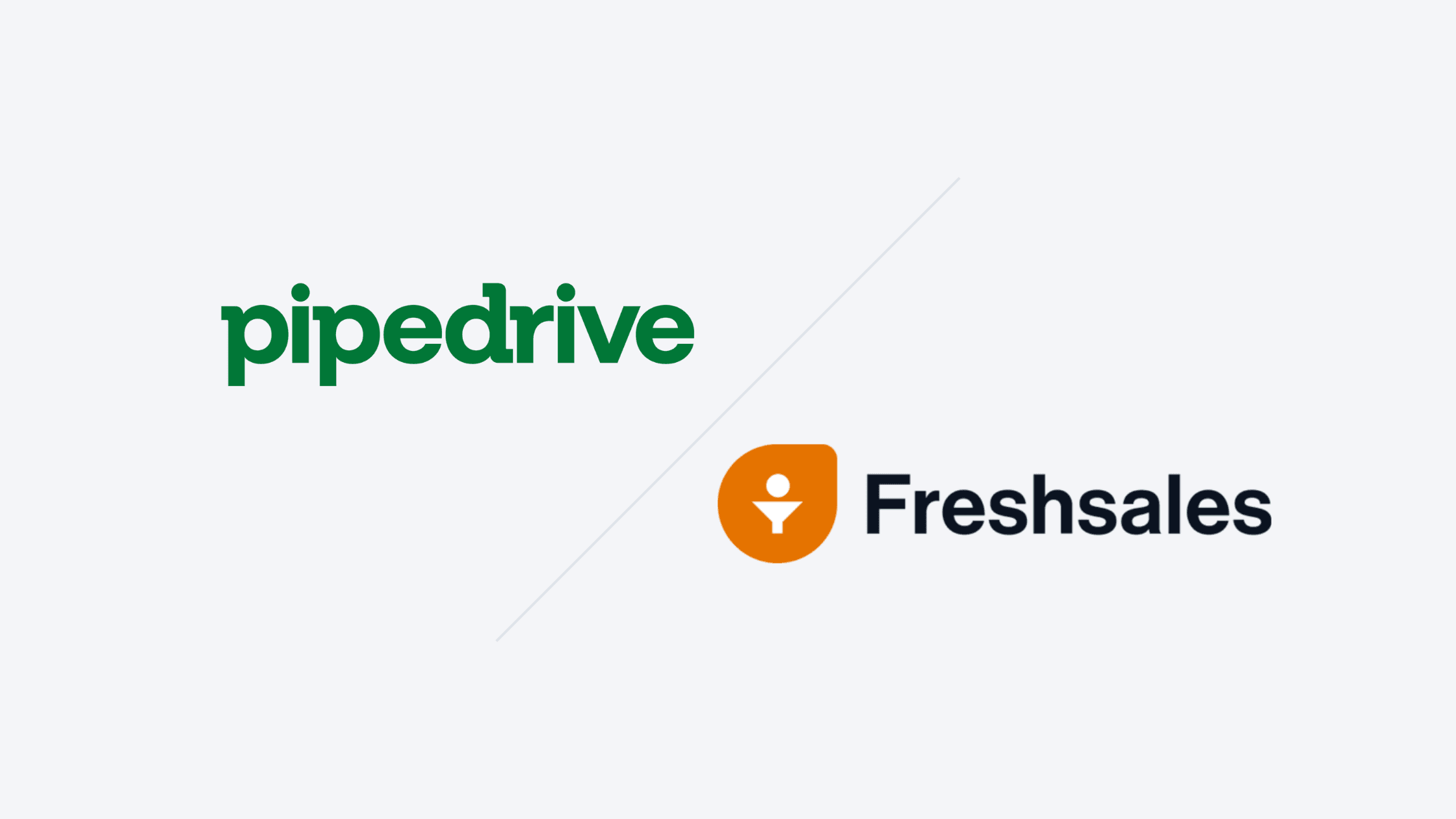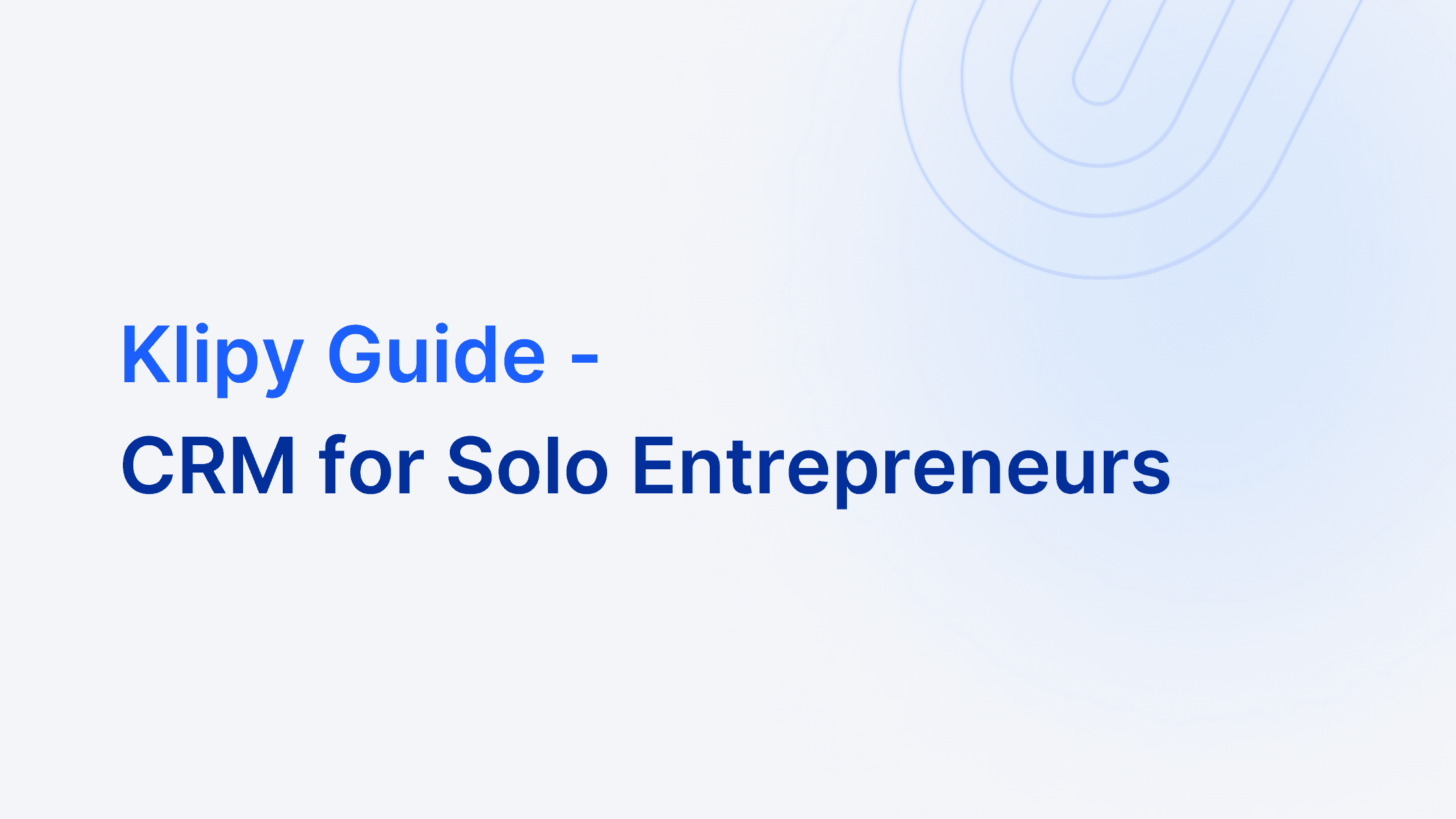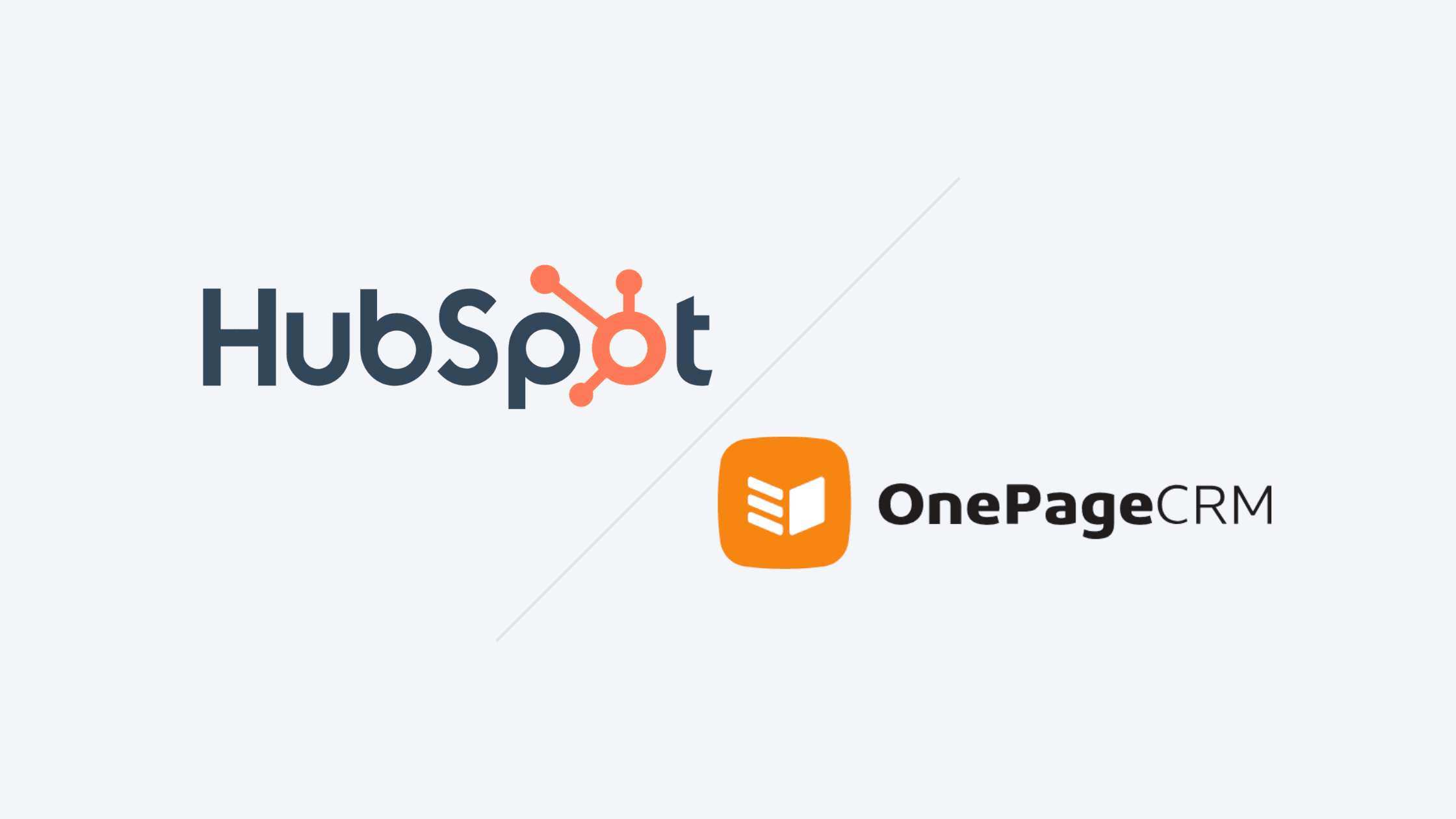Small Business
Simple CRM for Small Business: Pipedrive vs. Close CRM
Discover the best CRM for your small business with our detailed comparison of Pipedrive vs Close CRM. Learn about features, pricing, scalability, and more to find the perfect CRM solution tailored to your needs.
Simple CRM for Small Businesses: Why It Matters and How to Choose
For small business owners and startup founders, effective customer relationship management is the key to growth and success. Without the right tools, keeping track of leads, customer interactions, and sales pipelines can become overwhelming. That’s where a Customer Relationship Management (CRM) system comes in handy. But with so many CRMs out there, choosing the right one for your business can be daunting. Today, we’re comparing two popular CRMs: Pipedrive and Close CRM, both of which are known for their simplicity and efficiency.
Growing business signals more robust, standardized operations - including a CRM program.
63% of SMB leaders who use a CRM system say the number one benefit of a CRM is that it helps them provide better or faster customer service.
Online CRM software such as Close or Pipedrive for small businesses brings all customer data into one place, making it easier to understand customer behavior and tailor your marketing efforts.
There comes a moment where your business needs to migrate your client list from simple spreadsheets to a more robust, easy to visualize tool to make strategic decisions quickly. There can be 5 major signs your business needs a CRM outlined as:
You need a better way to track prospects and customers
Your prospects and customers have multiple points of contact.
You have a long or complex sales cycle.
Your goal is to grow your business.
You’re ready to leverage automation
A CRM (Customer Relationship Management) tool helps businesses manage their interactions with current and potential customers. It stores customer information, tracks communications, and organizes data to streamline sales processes. For small businesses, the right CRM can automate tedious tasks, allowing owners and sales teams to focus on growth and customer satisfaction.
Without a CRM, businesses often struggle with disorganized customer data, missed follow-ups, and inefficient sales processes. This is why many small business owners turn to simple yet powerful CRMs like Pipedrive and Close CRM.
We're comparing Pipedrive and Close to see which one works best for startups and small businesses as part of the research project to review and compare CRMs for small business owners.
We'll examine what makes each platform stand out, looking at their strengths and potential weaknesses. From ease of use to advanced capabilities, we'll cover everything.
This comparison will give you a clear view, helping you make the right choice for your business. Want to know which CRM could become your team's new favorite tool? Let's dive in.
Understanding Your CRM Needs
Pipedrive
Pipedrive is a sales-focused CRM designed for simplicity and ease of use. Built for small businesses, it helps manage leads, track deals, and streamline sales processes. Pipedrive is visually intuitive, featuring a drag-and-drop interface that lets users organize their sales pipeline with ease.
Pipedrive’s visual sales pipeline is one of its standout features. You can see exactly where each deal is in your pipeline, making it easier to prioritize and move deals forward. Plus, the drag-and-drop interface is a breeze to use.
Automation is another big win with Pipedrive. Routine tasks like follow-ups and lead assignments can be automated, freeing up your team to focus on what they do best—selling.
Reporting in Pipedrive gives you clear insights into your sales performance. You can track metrics like deal progress and individual sales rep performance, ensuring you’re always on top of your game.
Key Features:
Visual Sales Pipeline: Clear, drag-and-drop interface to manage your deals.
Automation: Automate routine tasks to save time.
Reporting: Get detailed insights into your sales performance.
Pros:
Simplicity: User-friendly interface that's easy to learn.
Sales Focused: Designed specifically to help you close deals.
Automation: Reduces the workload on repetitive tasks.
Cons:
Limited Customization: Not as flexible as some other CRMs.
Basic Features: Lacks some advanced features larger teams might need.
Integration Gaps: May not connect with all your existing tools.
Pricing:

Pipedrive is perfect for sales teams that need a straightforward, effective CRM to keep their pipeline moving. It’s especially useful for those who want to automate repetitive tasks and focus on closing deals without getting bogged down by unnecessary features.
Pipedrive offers a flexible pricing model designed to accommodate small businesses:
(Note: Prices are subject to change. Always check the official Pipedrive website for the most up-to-date pricing.)
Essential Plan: $14 per user/month. Includes basic pipeline management and email integration.
Advanced Plan: $34 per user/month. Adds workflow automation and more integrations.
Each tier offers progressively more advanced features, with the Enterprise plan providing the full suite of Pipedrive capabilities.
Check details of each tier and pricing here: Pipedrive Pricing
Pipedrive LeadBooster
LeadBooster is Pipedrive’s powerful and easy to use lead generation tool. You can capture high-quality inbound and outbound leads before they drift elsewhere.
How it works - four main features
1. Chatbot
The LeadBooster Chatbot engages website visitors 24/7, asking questions to qualify leads and routing the most promising ones to available sales reps. It can be customized to match your branding and sales process.
2. Live Chat
LeadBooster's Live Chat allows sales reps to connect with website visitors in real-time, even from their mobile devices. Reps can seamlessly take over conversations started by the Chatbot
3. Web Forms
LeadBooster's intuitive Web Form builder makes it easy to create custom forms to capture lead information. Forms can be embedded on your website or shared via email and social media. Lead data is automatically imported into Pipedrive.
4. Prospector
Prospector is a searchable database of over 400 million people and 10 million companies that you can use to find outbound sales leads. It allows you to filter by criteria like job title, location, and industry to identify your ideal customer profile.
Key Benefits of LeadBooster
Capture more leads: Engage website visitors 24/7 and route qualified leads to sales reps
Improve lead quality: Chatbot and Web Forms help you gather key information to qualify leads
Boost productivity: Automate lead capture and qualification to free up sales reps' time
Accelerate sales cycles: Quickly respond to leads and move them through the pipeline
Gain valuable insights: Analyze lead sources, conversion rates, and sales cycle metrics
Close CRM
Close CRM is tailored to sales-driven teams. With its focus on communication, Close CRM helps businesses engage with leads through email, calls, and SMS. It’s built for teams that want to optimize follow-ups, track interactions, and close deals faster. Unlike Pipedrive, Close CRM heavily emphasizes communication tools.
Key Features of Close CRM:
Built-in Calling and SMS: Make calls and send texts directly from the CRM.
Email Sequences and Automation: Automate email follow-ups to engage leads.
Task Management: Assign tasks and track activities seamlessly.
Lead Tracking: Track the full history of interactions with leads.
Pros:
User-Friendly Interface: Close CRM offers a clean and intuitive interface, making it easy for users to navigate and manage customer data effectively.
Built-In Calling Features: The platform includes integrated calling capabilities, allowing users to make calls directly from the CRM, which streamlines communication with clients.
Automation Tools: Close CRM provides various automation features that help reduce manual tasks, such as automated follow-ups and reminders, enhancing productivity.
Sales Pipeline Management: It offers robust sales pipeline visualization, helping teams track deals through various stages and prioritize effectively.
Lead Scoring: The system includes lead scoring features that help prioritize leads based on their likelihood to convert, enabling more focused sales efforts.
Cons:
Pricing: Close CRM can be on the pricier side compared to other CRMs aimed at small businesses, which may be a concern for startups or those with limited budgets.
Limited Customization: While it offers essential features, some users find the customization options are not as extensive as those offered by competitors.
Learning Curve for Advanced Features: Although the basic functionalities are easy to use, some advanced features may require additional training or time to master.
Pricing:
Close CRM offers a range of pricing plans tailored for small businesses, each designed to accommodate different needs and budgets. Here’s a detailed overview of the pricing structure, including key features for each plan.
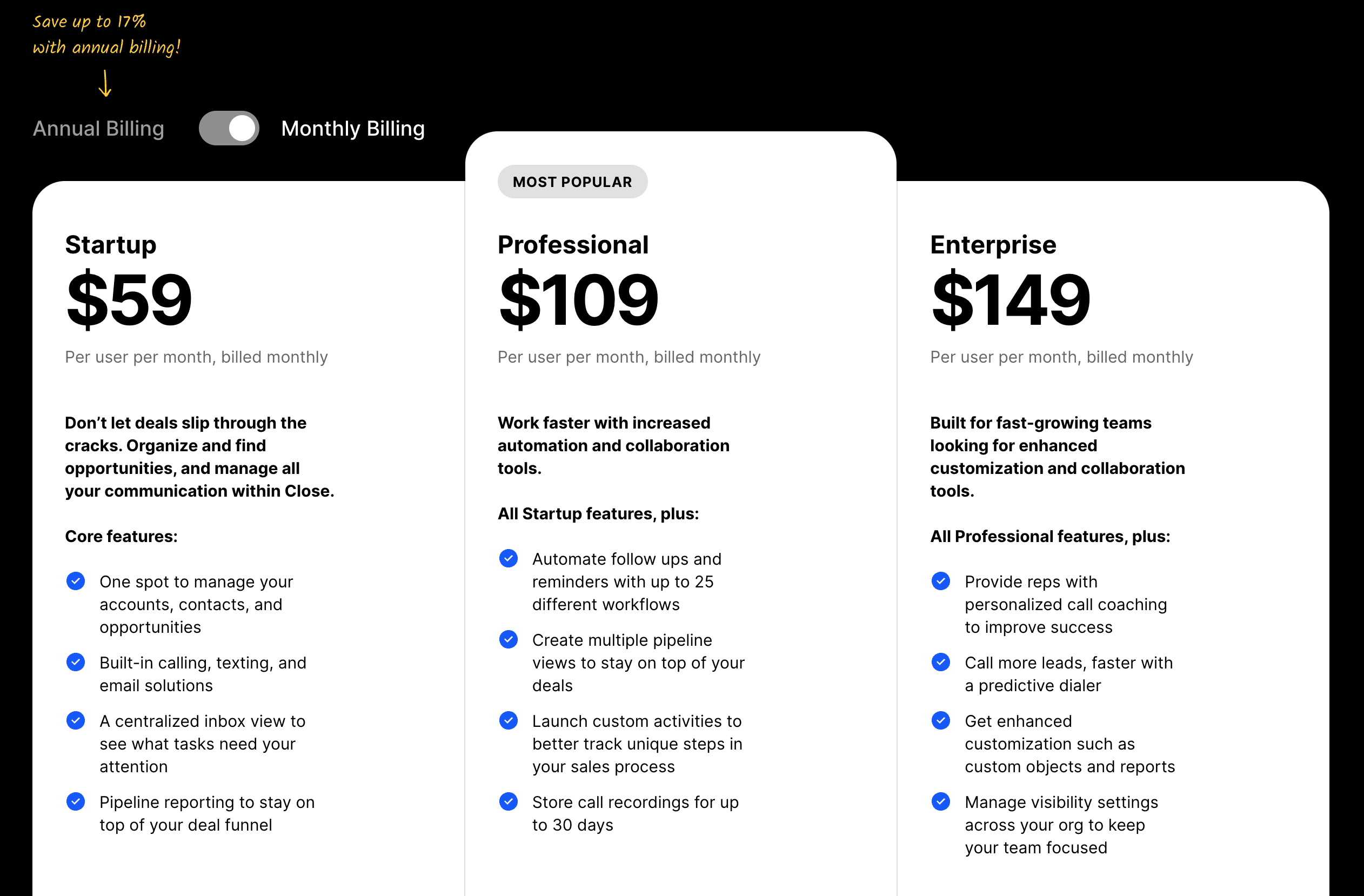
1. Startup Plan
Cost: $49 per month (discounted to $39 with annual billing)
Key Features:
Manage up to 25,000 leads.
Basic contact management and limited custom fields.
One custom activity and five workflows.
Email tracking and integration.
Ideal For: Very small businesses or solo entrepreneurs looking for an entry-level CRM solution.
2. Professional Plan
Cost: $99 per month (discounted to $89 with annual billing)
Key Features:
Unlimited SMS templates and call recordings for 30 days.
Up to three sales pipelines and 250 custom fields.
Enhanced reporting tools and automation capabilities.
More comprehensive workflow management with up to 25 workflows.
Ideal For: Small to medium-sized businesses that require more robust CRM functionalities.
3. Enterprise Plan
Cost: $139 per month (discounted to $129 with annual billing)
Key Features:
Unlimited call recordings and advanced reporting features.
Custom roles and permissions for team management.
Predictive dialer and screen share support.
Up to 100 workflows for complex sales processes.
Ideal For: Larger teams or businesses with high-volume sales operations that need extensive customization and support.
Additional Costs
Calling Costs: Close CRM uses Twilio for calling, which incurs additional charges based on usage (e.g., local calls in the U.S. may cost approximately $0.0130 per minute).
Zapier Integration: If using Zapier for automation, costs start at around $19.99 per month, depending on the plan selected.
Check details of each tier and pricing here: Close CRM Pricing
Comparing Pipedrive vs Close CRM Features
These are some more detailed review of Pipedrive and Close broken down to key CRM features that are important for small business owners and startup founders.
Pipedrive vs Close: How They Stack Up
When it comes to choosing between Pipedrive and Close, it's all about the details. Let's dive into how these two CRM powerhouses compare on some key features:
Ease of Use
When it comes to user-friendliness, both Pipedrive and Close are known for their intuitive interfaces.
Pipedrive is known for its easy-to-navigate interface. The drag-and-drop system allows users to move deals through various stages of the pipeline effortlessly. It’s perfect for small teams looking for a straightforward CRM that doesn't require heavy onboarding or training.
On the other hand, Close CRM is also user-friendly but is particularly optimized for sales teams that rely on communication tools. Its built-in calling, texting, and email features are accessible from the main dashboard, which keeps the user experience focused and efficient.
Sales Pipeline Management
Both CRMs offer excellent tools for managing sales pipelines.
Pipedrive: Users can customize pipeline stages, drag-and-drop deals, and get a clear visual of where each deal stands. It’s incredibly easy to update the pipeline in real time, making it an ideal solution for teams who need a highly visual sales tool.
Close CRM: Pipeline management in Close CRM is also efficient, though its emphasis is more on lead communication. While the pipeline view is available, it’s not as visual as Pipedrive’s. The communication-first approach sets Close CRM apart in this category, as the pipeline integrates smoothly with calls and emails.
Automation Features
Automation is a major selling point for both CRMs.
Pipedrive: Offers workflow automation where users can set up triggers. For example, when a deal moves to a new stage, Pipedrive can automatically schedule a task or send an email.
Close CRM: Automation in Close CRM is heavily communication-driven. You can set up email sequences that are triggered based on lead behavior or deal stages, helping teams engage prospects without lifting a finger.
Lead Management and Communication Tools
Pipedrive: Offers basic lead management, with tools to log interactions, set follow-up reminders, and schedule activities. The communication tools are good but require integrations for calling or advanced email features.
Close CRM: Outshines Pipedrive when it comes to communication. Close CRM has built-in calling, SMS, and email tracking. This makes it easy to track all communications in one place, a major plus for sales-heavy teams.
Email and Calling Features
Pipedrive integrates with third-party tools for email and calling, such as Gmail or Zoom. This approach is flexible but requires some setup.
Close CRM, on the other hand, offers native email, SMS, and calling functionalities. You can directly make calls from the CRM, send text messages, and track all interactions in one unified platform. This makes Close CRM an all-in-one communication hub for sales teams.
Customization and Integrations
Both Pipedrive and Close CRM offer customization, but Pipedrive excels with its highly visual dashboard and customizable fields, allowing users to mold the CRM to their needs.
Close CRM is also customizable, though its strength lies in its communication integrations. It integrates well with tools like Slack, Zapier, and others to create an optimized sales experience.
Customer Support and Resources
Both CRMs offer solid customer support.
Pipedrive: Provides 24/7 live chat, email support, and a knowledge base. Their customer service is responsive, and onboarding materials are comprehensive.
Close CRM: Offers email and live chat support during business hours, along with a detailed help center. The customer support team is knowledgeable, especially in solving sales-specific issues.
Both CRM has its strengths, so the right choice depends on your specific needs. Whether prioritizing ease of use, automation, integration, scalability, or cost, there’s an option out there for you. For a deeper dive into CRM options suitable for small and medium businesses, including comparisons between popular alternatives like Attio vs HubSpot and Folk vs HubSpot, you can explore more insights on enhancing customer management and driving growth.
Which CRM is Right for Your Business?
Pros and Cons of Pipedrive
Pros:
Highly visual and intuitive pipeline management
Easy-to-use interface with drag-and-drop functionality
Affordable pricing
Cons:
Requires third-party tools for calling and advanced communication
Limited native communication features compared to Close CRM
Pros and Cons of Close CRM
Pros:
Native calling, SMS, and email functionalities
Strong automation for follow-ups and email sequences
Perfect for communication-heavy sales teams
Cons:
Higher pricing
Pipeline management is less visual compared to Pipedrive
Choosing between Pipedrive and Close depends on your specific business needs. If you’re looking for simplicity and a visual sales pipeline, Pipedrive is the way to go. However, if your business thrives on communication and follow-up, Close CRM offers a more integrated solution.You may reference our other articles related to CRM software for small businesses:
More from the blog
